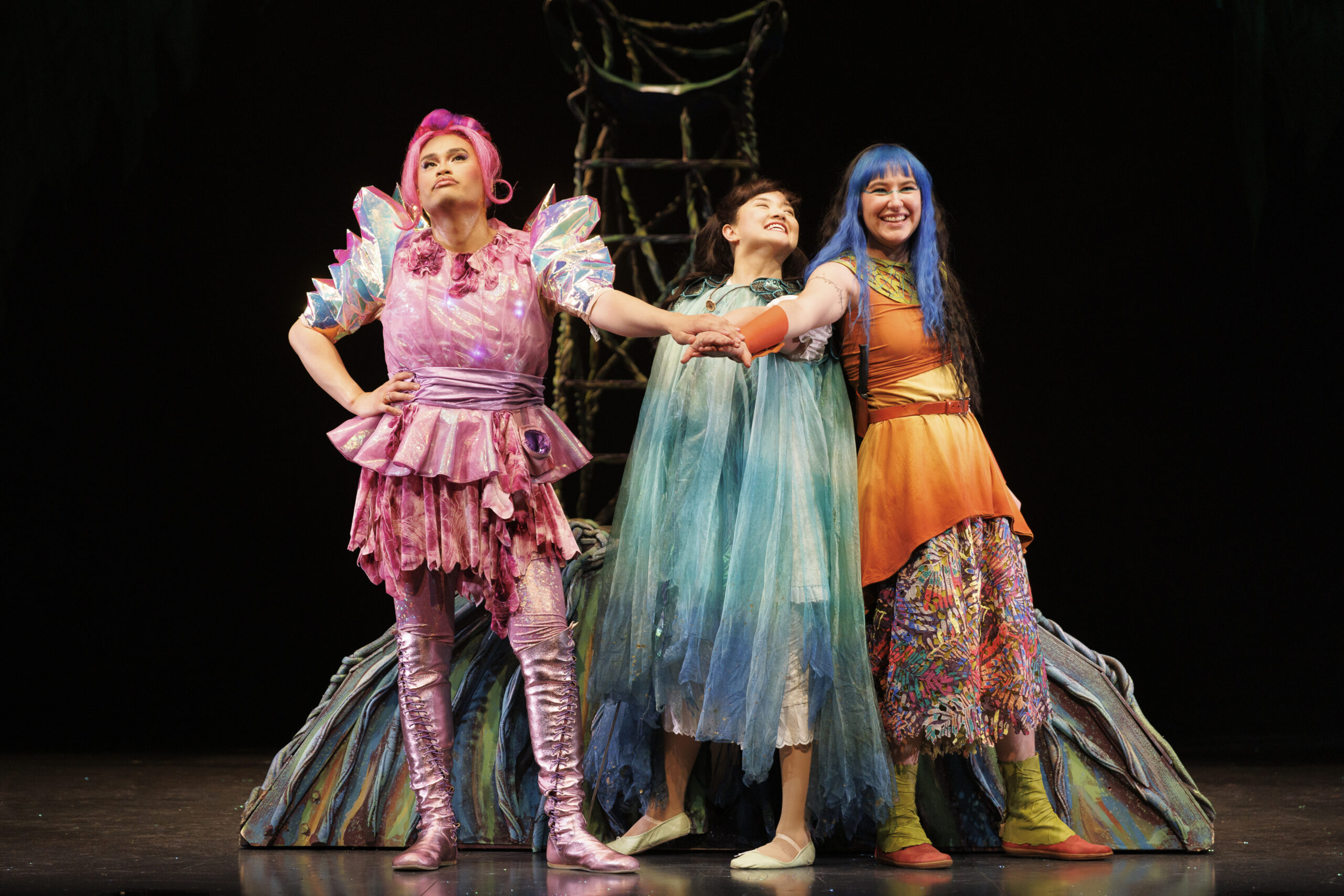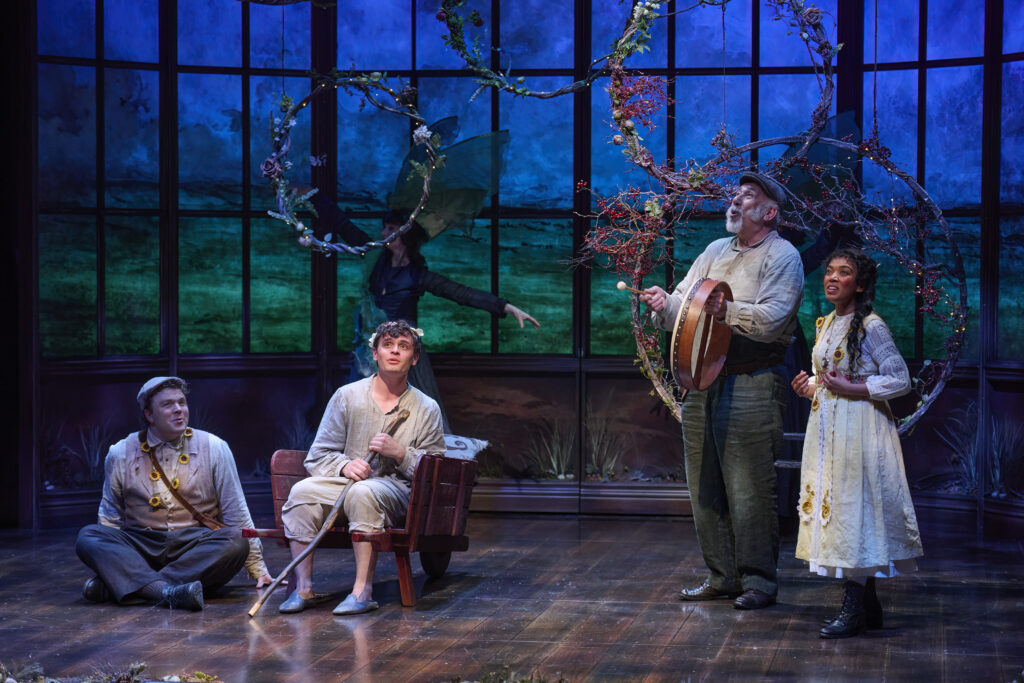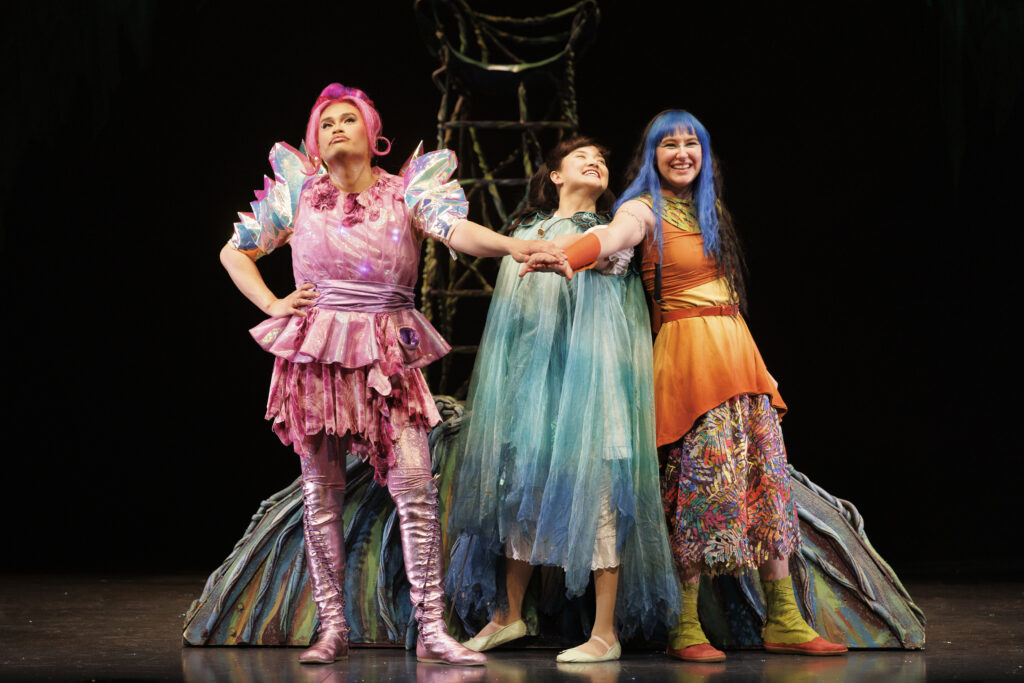
You can usually count on the shows aimed at the young folk to be some of the best at the fest, but not this year.
The better of the two, the Shaw’s The Secret Garden, is on the dull side, while Stratford’s Wendy and Peter Pan is alarming, to say the least.

The Secret Garden (A Play with Songs), based on the novel by Frances Hodgson Burnett, adapted for the stage by Jay Turvey and Paul Sportelli, directed by Jay Turvey, Royal George Theatre, closes Oct. 13.
While The Secret Garden has many of the elements you need for a children’s show to work, they somehow don’t quite come together to create the magic, despite the imaginative sets of Beyata Hackborn, Judith Bowden’s fanciful costumes, and Jay Turvey’s creative staging.
For those who don’t know the story, here’s a precis. Having been orphaned by cholera in India, young Mary Lennox (Gabriella Sundar Singh) is sent to live with her dour uncle Archibald Craven (David Alan Anderson) on the bleak Yorkshire moors and is put under the stern tutelage of housekeeper Mrs. Medlock (Sharry Flett).
There she learns about a secret garden from the estate gardener Ben Weatherstaff (David Adams), discovers she has an invalid cousin called Colin (Gryphyn Karimloo), and meets three nice locals, Dickon (Drew Plummer), a young man who communes with nature, his sister Martha (Jacqueline Thair), and their mother Mrs. Sowerby (Patty Jamieson). As Mary, Dickon and Colin bring the secret garden back to life, truths are revealed, and harmony is restored. And oh yes, there is a helpful Robin (Tama Martin).
I happen to love this story, and more to the point, I didn’t mind, in the least, the inclusion of some of my favourite traditional English folksongs, although, perhaps, the additional music does slow things down a trifle. However, as I sat through The Secret Garden, I kept wondering, why is this production that has so much going for it, not enchanting or captivating – or more to the point – not drawing me in?
So, what, then, is missing? Sadly, it is the sense of drama and wonder, whose absence, unfortunately, makes for a routine production. An attractive visual component alone is not enough. I think that Turvey and Sportelli were so caught up in adding in the songs and working with the artistic team to come up with visual goodies, that the final product became paint by numbers and predictable, and by that, I mean the delivery.
In the final analysis, the acting company recite their lines in decent fashion, but nothing more beyond that, except for Karimloo, who does manage to inject energy into Colin to lift him off the stage. There are no weak performances per se. These are all very good actors, but it’s a mail in. Characters are created, but not animated, manifesting in a production that is missing both heart and excitement.
And an afterthought. There are some interesting design choices, such as the accumulation of stylized rings of flowers that document the garden coming alive again, but I did miss the wild profusion of colourful foliage that could evoke the garden.

Wendy and Peter Pan, adapted by Ella Hickson, from the book by J.M. Barrie, directed by Thomas Morgan Jones, Avon Theatre, closes Oct. 27.
As for Stratford, what on earth was artistic director Antoni Cimolino thinking by including British playwright Ella Hickson’s cheerless 2015 adaptation of Barrie’s beloved novel in the Schulich Children’s Plays series?
And my chief complaint – how about this for starters – a new dead brother for the Darling children called Tom, which becomes the motivation for Wendy to follow Peter to Neverland, believing Tom to be one of the Lost Boys. Now that’s a jolly start to a children’s play, right? The death theme comes into full flower at the end of Act One when Hook supposedly kills Peter, so children can cheerfully contemplate the image of Peter’s dead body throughout the intermission.
The title also gives away another of Hickson’s idiot delights. Wendy and Peter Pan reverses Barrie’s name order in the title – so we are getting an emphasis on Wendy (Cynthia Jimenez-Hicks), which means female empowerment, one would think, showing an intelligent young girl finding confidence and inner strength as she moves toward womanhood. Hickson’s Wendy, however, is an annoying whiner, forever demanding of Peter where her brother Tom is, until you just want her to shut up.
As for the other two female icons (at least in Barrie’s original) – Tiger Lily (Tara Sky) and Tinkerbell (Nestor Lozano Jr.) – we have a warrior and a fairy who get into a cat fight, which is halted by the peace-loving Wendy. Is there a feminist message somewhere in there? (Don’t forget Tink is gender bended.) On a positive feminist note, Mrs. Darling (Agnes Tong) does become a suffragette, with her husband’s (Sean Arbuckle) approval, so that’s encouraging, I suppose.
And then there’s Hickson’s amorphous Peter (Jake Runeckles). The actor has a very agile body and is certainly elfin enough in spirit and form, but both the character and the actor seem detached from the play. Runeckles appears to be doing his own thing. It’s as if Hickson didn’t know what to do with the character of Peter, so director Thomas Morgan Jones seems to have made the decision to just let him be acrobatic. In this adaptation, Peter’s like loose change, allowing others to carry the banner for Hickson’s agenda on death, dying and feminism.
Poor Capt. Hook (Laura Condlln) has been made into a grumpy old man who is jealous of Peter’s youth. He even gives a speech about old age. Another Hickson woke-ism, is a nod to same sex relationships, with Smee (Sara-Jeanne Hosie) suffering from unrequited love for Hook. Incidentally Smee dies too, so chalk up another death. Mercifully, Wendy’s brothers, John (Noah Beemer) and Michael (Justin Eddy), seem to be the most conventional characters in Hickson’s adaptation, although – woke-ism alert – the latter seems to be a little on the gay side.
And where, oh, where is Nana, the doggy nanny? Clearly, Hickson didn’t want that beloved character in her world. Too much whimsy? Too much fantasy? Thus, along with Nana, Hickson has excised any joy, any magic, any excitement, from her tedious script.
Speaking of which, you know those lyrics from My Fair Lady – Words! Words! Words! I’m so sick of words! Well, Hickson’s adaptation generates that same feeling. Where one word would do, the playwright uses three. The dialogue seems endless and laboured, which, added to the fact that everyone is screaming or shouting, makes for a very noisy show.
Yes there are lots of highflying events, and swordfights galore, and showy sets, and colourful costumes, but nothing can save this production from its ill-conceived script.
I did like the crocodile though, evoked through actor Marcus Nance driving what looks like an old-fashioned Formula One racing car.
